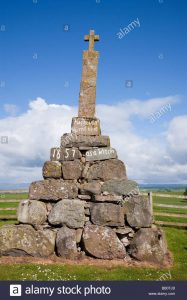A Cross and a Cairn
Dunning, Perthshire, Scotland 1657

She lit a tallow candle in the carved turnip and placed it on a small table by the hearth. The candle and the hearth caused shadows to dance like lost spirits across the whitewashed stone walls. She opened the cottage door to take a look outside. Highland winds from the moors and mountains swept red rowan leaves across the stone path leading into town. Barefoot, she stepped outside her cottage, drawing her tartan cloak tighter about her to warm her. The position of the stars and moon indicated dawn would soon be approaching and with the new day would come news of the town meeting the bishop had called. She knew what they had discussed—the Scottish Witchcraft Act. The bishop had preached plainly that he knew that she, Maggie Wall, was a witch and should be punished in accord with the 1563 law that made the practice of witchcraft or consulting with witches a capital offense.
That was why the village women had stopped coming to her for healing. All except for Bronwynn, the little girl who came to town once a week with her father. While her father marketed his dirks and sgian-dcubhs, Bronwyn would play plainly-clappy or peeves beds with the other girls. Then she would always slip away to Maggie’s cottage at the edge of town for porridge. Bronwynn would ask to go with her to gather plants. The child had an insatiable curiosity and amazing memory. And there were other things Bronwynn did and said that made Maggie wonder about her.
As the day dawned, Maggie watched the sutlers and farmers stream into Dunning and set up their products for sale. Bronwynn and her father Angus were with them, sacks of merchandise on their backs. As they passed her, Angus said, “Good morn, my Bonnie lass!”
“”Madainn mhath to you too, sir,” Maggie replied. You handsome, Scott, she thought.
Bronwynn waved and blew her a kiss. “I’ll come see you soon, Maggie!”
Later, Maggie heard Bronwynn’s tap on her door. “Come in, child.” Maggie was writing out a love-charm for a young lady to help her attract a young man. She set the parchment and quill pen down. Bronwynn slipped in and asked, “What are you writing?”
“A charm for Fionna.”
“She is not a bonnie lass, so I believe she will need your help.” As usual, Bronwynn circled the cottage, looking at each of the drying plants hanging from a rope on the back wall, and stopping at the hearth. “I love the smell of peat,” she said. She laughed when she saw the carved face on the turnip candle holder. I’m going to be like you someday, Maggie.”
“What makes you say that, Bronwynn?
“Like you, I’ve got second sight.”
In a way, Maggie was not surprised. There had been too many signs—too many questions, the look in her eyes. And now, she posses an da shealladh, the gift of second sight, the gift of premonitions of the future.
“Do you like what you see in the future, Bronwynn?”
“Yes, and no. What have you seen about your future, Maggie?” Bronwynn picked up an agate lapidary, slipped it under Maggie’s pillow on her small bed and said, “If the stone be good.”
“You are a quick learner,” Maggie said. “About me, I’ve seen very little. But I do see a young woman living in this outage. She’s barefoot and dressed in a peasant blouse and a tartan skirt. I’m not sure what means, but I think you are that girl. What does your gift say about me?”
“They are going to burn you for being a witch, Maggie. Tonight. And I and my father will be the only ones to weep for you. I think my father loves you, Maggie. Since my mother died he’s been very lonely.” Bronwynn stepped up to Maggie and hugged her tightly, sobbing. But you will always be remembered in Scotland. Always, but especially in my heart.”
Maggie opened the door and saw the bishop and his entourage approaching. “Go now, Bronwynn.” She kissed Bronwynn on the head, and when she did, in her own second sight, she saw the post she would soon be tied to, the branches piled about it and saw the bishop’s hand lighting the fire.
Bronwynn wept as she left the cottage and begged her father to not leave town. She watched as Maggie was drawn and chained to the post, her clothes torn, the crowd taunting and jeering, The fire was lit and as the smoke and flames rose, Bronwyhnn closed her eyes and saw in her second site a monument in Dunning with a twenty-foot cairn, a tall cross on top and gifts of pennies, feathers, shells, fluffy stuffed animals and tiny sea candles strewn about it. On a large flat stone plague someone had written in white letters: MAGGIE WALL. BURNT HERE AS WITCH IN 1657. She saw this monument as clear as day. And as the site shifted, she saw herself as a young woman living in Maggie’s cottage. And she saw a frowning cowled priest dragging her by the arm toward her death fire. The face of Maggie rose as a spectre in her mind’s shadows and she heard Maggie whisper, “Don’t be afraid.”
